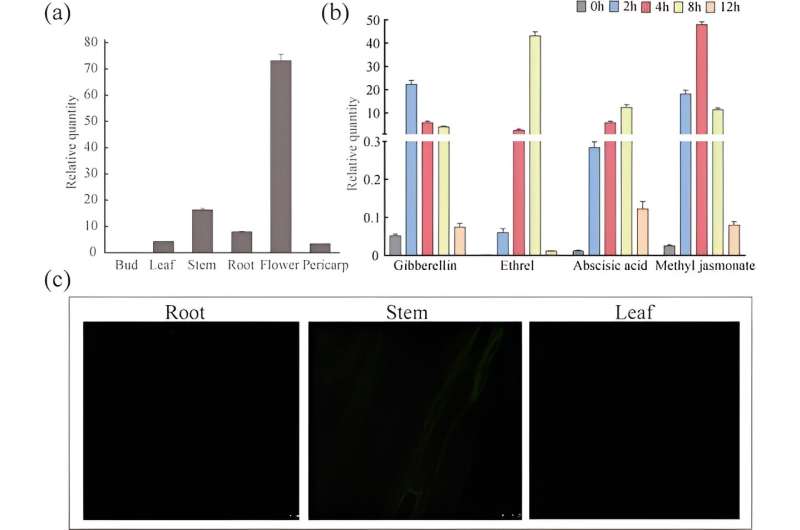Expression patterns of TCS1 in ‘Fuding Dabaicha’s. Credit: Horticulture Research (2023). DOI: 10.1093/hr/uhad162
Caffeine, a significant bioactive alkaloid found in tea, cacao, and coffee, plays a crucial role in plant defense and human consumption. Despite its widespread use and biological importance, the transcriptional regulation of its biosynthesis remains largely unexplored.
Recent research has identified multiple biosynthetic pathways for caffeine in plants, with the tea caffeine synthase 1 (TCS1) gene playing a pivotal role in this process. However, only a few TFs like NAC and MYB have been characterized in regulating TCS1, indicating a need for further research to fully comprehend and potentially control caffeine biosynthesis in tea plants.
In August 2023, Horticulture Research published a study titled "The transcription factor CsS40 negatively regulates TCS1 expression and caffeine biosynthesis in connection to leaf senescence in Camellia sinensis ."
In this study, researchers investigated the role of the CsS40 transcription factor in caffeine biosynthesis and its impact on tea plant physiology. The expression pattern of the TCS1 gene, crucial for caffeine synthesis, was examined in different tea plant tissues using RT-qPCR, revealing higher expression in flowers compared to other parts.
The regulatory effects of hormones and light on TCS1 were also investigated, and the results showed that TCS1 was up-regulated after hormone treatment and then returned to basal levels.
To further explore this, the TCS1 gene, including its promoter pro-TCS1, was inserted into a vector and used to transform tobacco plants. The resulting transgenic plants displayed GFP signal patterns consistent with TCS1 expression in tea plants.
A yeast one-hybrid assay was conducted to identify transcription factors that regulate TCS1. This led to the discovery of a candidate transcription factor, CsS40, from a tea leaf protein expression library.
Its role was further validated through split-luciferase complementation and electrophoretic mobility shift assays, confirming its binding and activation of the TCS1 promoter. Overexpression of CsS40 in tobacco plants was found to increase the accumulation of caffeine precursors and accelerate leaf senescence, while its silencing in tea plants using VIGS technology led to an increase in caffeine content.
In addition, overexpression of CsS40 in tea callus inhibited TCS1 expression and caffeine accumulation, whereas silencing CsS40 had the opposite effect. It was found that the caffeine content of tea decreases as it ages, which is associated with an increase in CsS40 expression.
In summary, this study provides significant insights into the molecular mechanisms of caffeine biosynthesis in tea plants, demonstrating that CsS40 is a key regulator that influences caffeine levels and leaf senescence, thereby affecting the physiological and biochemical characteristics of tea plants.
More information: Xinzhuan Yao et al, The transcription factor CsS40 negatively regulates TCS1 expression and caffeine biosynthesis in connection to leaf senescence in Camellia sinensis, Horticulture Research (2023). DOI: 10.1093/hr/uhad162
Journal information: Horticulture Research
Provided by TranSpread























